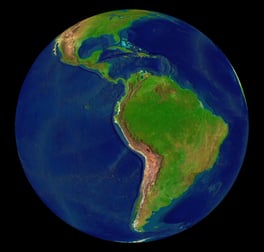September 2025
Missing the Golden Age of U.S.-Latin American Relations
Region: Latin America
Author: Hector Schamis
The 1990s should be considered the golden age of U.S.-Latin American relations. The end of the Cold War, German reunification, and the expansion of the EU and NATO eastward would guarantee freedom, security, and prosperity for Europe and beyond. Democracy and free trade would reinforce each other and serve as a model for the rest of the world.
The 1990s should be considered the golden age of U.S.-Latin American relations. The end of the Cold War, German reunification, and the expansion of the EU and NATO eastward would guarantee freedom, security, and prosperity for Europe and beyond. Democracy and free trade would reinforce each other and serve as a model for the rest of the world.
Indeed, the optimism of that era reached the Western Hemisphere. Policy innovations were designed to leave behind the recession of the 1980s, the “lost decade.” With development and trade high on the agenda, the George H. W. Bush Administration led the effort. In 1990, he launched the “Enterprise for the Americas Initiative,” the conceptual framework of the Brady Plan for debt relief, an IDB credit line, and the promotion of freer trade through integration.
The approach was bipartisan. NAFTA was signed in 1992, right on the eve of the transition from Bush to Clinton. The idea of a Free Trade Area of the Americas, FTAA-ALCA, came out of the First Summit of the Americas in 1994, and subsequently, partial trade integration agreements were signed with Chile, Central America (CAFTA), Colombia, Panama, and Peru, among others. Deeper trade integration among Latin American nations, in turn, crystallized later in the Pacific Alliance and the Andean Community.
Bipartisanship reinforced cooperation in the area of security as well —think of “Plan Colombia,” for example. Conceived by Clinton and Pastrana in 1999, it was signed into law in the U.S. in 2000 and subsequently supported and expanded upon by George W. Bush and Obama. The context was propitious for a hemispheric agreement on democracy, and so in September 2001 the Inter-American Democratic Charter was signed by all nations of the Americas except Cuba.
However, the idea of a continental integration agreement on this side of the Atlantic was frustrated at the Mar del Plata summit in 2005. From then on, with the barrel of crude above $100, the ALBA and Petrocaribe began to gain influence. Anti-Americanism and protectionism returned with force, and with them the influence of Castroism. The economies of the region grew based on favorable international prices, yet a windfall that ended with the change of the cycle starting in 2011-12.
As bipartisanship gradually declined in the U.S., mainstream foreign economic policy began to lose traction in the Americas. Democratic backsliding has thus been accompanied by economic slowdown and the deterioration of security. The pandemic deepened these dynamics, highlighting an obvious counterfactual: Had the FTAA-ALCA flourished in the 1990s, the hemisphere would have been better prepared to mitigate the devastating effects of the pandemic and speed up the recovery.
Consider that intra-regional trade in the Americas represents 46% of total trade, and barely 30% within Latin America and the Caribbean. In contrast, the same indicator is equivalent to 60% in Asia and 70% in Europe. There is still a long way to go to rebuild the trade-investment-employment relationship in the hemisphere, a virtuous circle of prosperity.
Recognizing that the U.S. has not offered the rest of the Americas a convincing alternative to China’s economic projection, the “Americas Trade and Investment Act,” a bipartisan and bicameral bill introduced in March 2024, tackles that issue. It represents a multi-billion-dollar effort that seeks to expand intra-hemispheric trade, generate investment opportunities, and create jobs, thereby addressing the root causes of migration.
The promise of integration in the Americas remains desirable, necessary, and still unfulfilled. Only a bipartisan Washington can address this task. We surely miss it.
